7 The Earthly And Temporary Covenants: Two Elect Peoples And The Noahic Covenant
A Summary Of The Teaching Video
Some of the points I cover in this teaching video:
Having explained the significance of the Messiah’s bloodline in the previous study, I distinguish between two “elect” groups of people recorded in the scriptures—the physically elect and the spiritually elect. The physically elect are those persons belonging to the Messiah’s bloodline leading to the incarnation of Christ. The spiritually elect are those persons belonging to Father’s saving purpose in the redeeming grace of Christ. The physically elect were secured earthly blessings under earthly covenants, whereas the spiritually elect are secured heavenly blessings under the spiritual covenant of redemption (grace).
After making these distinctions, I concentrate the remainder of the study on the covenant God made with Noah. Its laws and blessings are highlighted, together with an explanation why the covenant terminates with the second coming of Christ.
Jared Smith, Muntinlupa, PH (9/12/2022)
An Outline Of The Teaching Video
The Arrangement Of The Biblical Covenants
A Summary Statement On What I Believe With Reference To The Earthly And Temporary Covenants
The Jewish People As A Race Was Set Apart With Special Honor Because It Was The Biological Lineage Through Which The Messiah Would Be Born
The Focal Point Of The Old Testament Scriptures Is The Biological Lineage Of The Messiah—Genesis 1-11 Recording The History Of The First 2,000 Years Prior To The Creation Of The Jewish Race; Genesis 12-Malachi 4 Recording The History Of The Last 2,000 Years After The Creation Of The Jewish Race.
Why Did God Create The Jewish Race And Set Them Apart With Special Honor?
God Honored The Bloodline Of The Messiah During The First 2,000 Years, Between Adam To Abraham
God Honored The Bloodline Of The Messiah During The Last 2,000 Years, Between Abraham To The Virgin Mary
According To Deuteronomy 7, God Honoured The Jewish People As A Nation Because It Was The Bloodline Of The Messiah
The Special Honor God Bestowed Upon The Jewish People As A Race And Nation Has Nothing To Do With The Spiritual And Perpetual Covenants, Or That Of Redemption, Salvation And Regeneration
Distinguishing Between The Physically Elect (Jewish People As A Race) And The Spiritually Elect (Sinners Saved By Grace)
From Adam To The Virgin Mary, The Messiah’s Family Was Set Apart By God With Special Honor And Governed By Various Covenants In Virtue Of The Fact That They Were Simply The Family Members Of The Messiah—It Was A Privilege Extended To Them Based Squarely Upon Their Biological And Racial Distinctive
The Noahic Covenant—This Is The Only Earthly Covenant God Made With The Messiah’s Bloodline During The First 2,000 Years Of History
The Duration Of The Noahic Covenant (Genesis 8:20-22)—It Is Not An Everlasting Covenant
The Laws Of The Noahic Covenant (Genesis 9:1-7)—(1) Nutrition, Eating Meat; (2) Sanctity Of Human Like, Death Penalty; (3) Procreation, Having Children.
The Blessings Of The Noahic Covenant (Genesis 9:8-17)—A Flood Of Waters Will Not Again Destroy The Earth
Reviewing The Laws, Blessings And Duration Of The Noahic Covenant
The Laws Of The Noahic Covenant (Genesis 9:1-7)—(1) Nutrition, Eating Meat; (2) Sanctity Of Human Like, Death Penalty; (3) Procreation, Having Children
The Blessings Of The Noahic Covenant (Genesis 9:8-17)—A Flood Of Waters Will Not Again Destroy The Earth
The Duration Of The Noahic Covenant (Genesis 8:20-22)—It Is Not An Everlasting Covenant
The Meaning Of The Word “Everlasting”
The End Point Of The Noahic Covenant—The Second Coming Of Christ, When The Earth Will Be Destroyed By A Worldwide Fire (2 Peter 3:3-13)
The Noahic Covenant Grants To Us The Promised Preservation Of The Blessings We Now Enjoy Upon This Earth Until The Blessed Day Of The Messiah’s Return, At Which Time This Covenant Will Be Terminated And The New World Ushered In By Christ
A Final Word
An Automated Transcript Of The Teaching Video
I’d like to welcome you back for another study in the Word of God. We’re going to continue our subject on the earthly and temporary covenants. I’d like to begin by reviewing with you what we have thus far been looking at on the topic of biblical covenants.
The Arrangement Of The Biblical Covenants
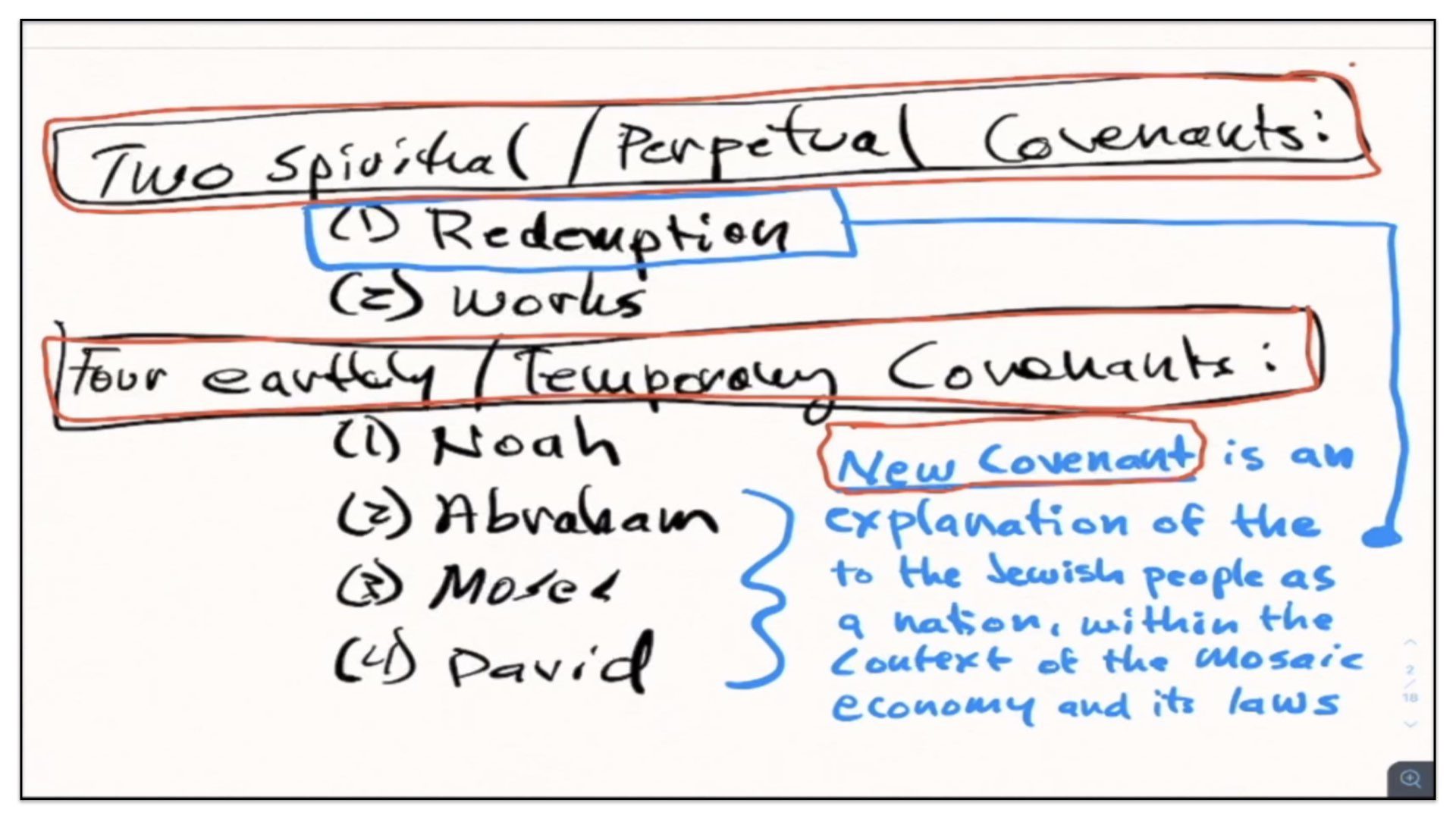
I believe the biblical covenants can be arranged under one of two categories. First, there’s the two spiritual and perpetual covenants—that of Redemption and Works. And second, there’s the four earthly and temporary covenants—that of the Noahic, Abrahamic, Mosaic and Davidic. Then, of course, there’s something called the New Covenant. I don’t believe the New Covenant is an actual covenant. Rather, I believe it’s an explanation to the Jewish people as a nation of the Covenant of Redemption within the context of the Mosaic economy and its laws. Now, in a nutshell, that’s my understanding of the biblical covenants. In the last few weeks, we have been focusing our attention on the four earthly covenants, and we’re going to pick up on that topic again today.
A Summary Statement On What I Believe With Reference To The Earthly And Temporary Covenants
Now, I prepared for you a written summary of my view on these covenants and I’m going to read to you that summary again. I’ll ask for your patience, especially if you had been following this line of teachings in the previous weeks. I’m quite certain by now you’re familiar with the statement, but for clarity’s sake and making sure everybody’s brought along with us in the teaching, I’m going to read that statement to you again anyway:
“I believe the thread which ties together the earthly covenants is the promise of the coming Messiah. First, each covenant was made by God with individuals belonging to the bloodline through which the Messiah would be born; and second, the purpose for each covenant is directly linked to the coming Messiah. It’s from this bloodline that God the Father would prepare a body for His Son, and is for this reason God set this bloodline apart with special honor (making with them earthly covenants, giving to them special laws and bestowing upon them earthly blessings) during the first 4,000 years of history. However, with the birth of the Messiah came the end of this bloodline, resulting in the cancellation of these covenants and the termination of the special honor God placed upon the Jewish people as a race. In no sense should these earthly covenants be identified with a conditional Covenant of Grace or to be one and the same with the Covenant of works or the Covenant of Redemption. The earthly covenants were designed by God to establish the boundaries around which He would relate to and bestow earthly blessings upon the Jewish people as a race, in honor of the Messianic bloodline. The spiritual covenants are designed by God to establish the boundaries around which He relates to the non-elect and the elect throughout the course of history.”
The Jewish People As A Race Was Set Apart With Special Honor Because It Was The Biological Lineage Through Which The Messiah Would Be Born
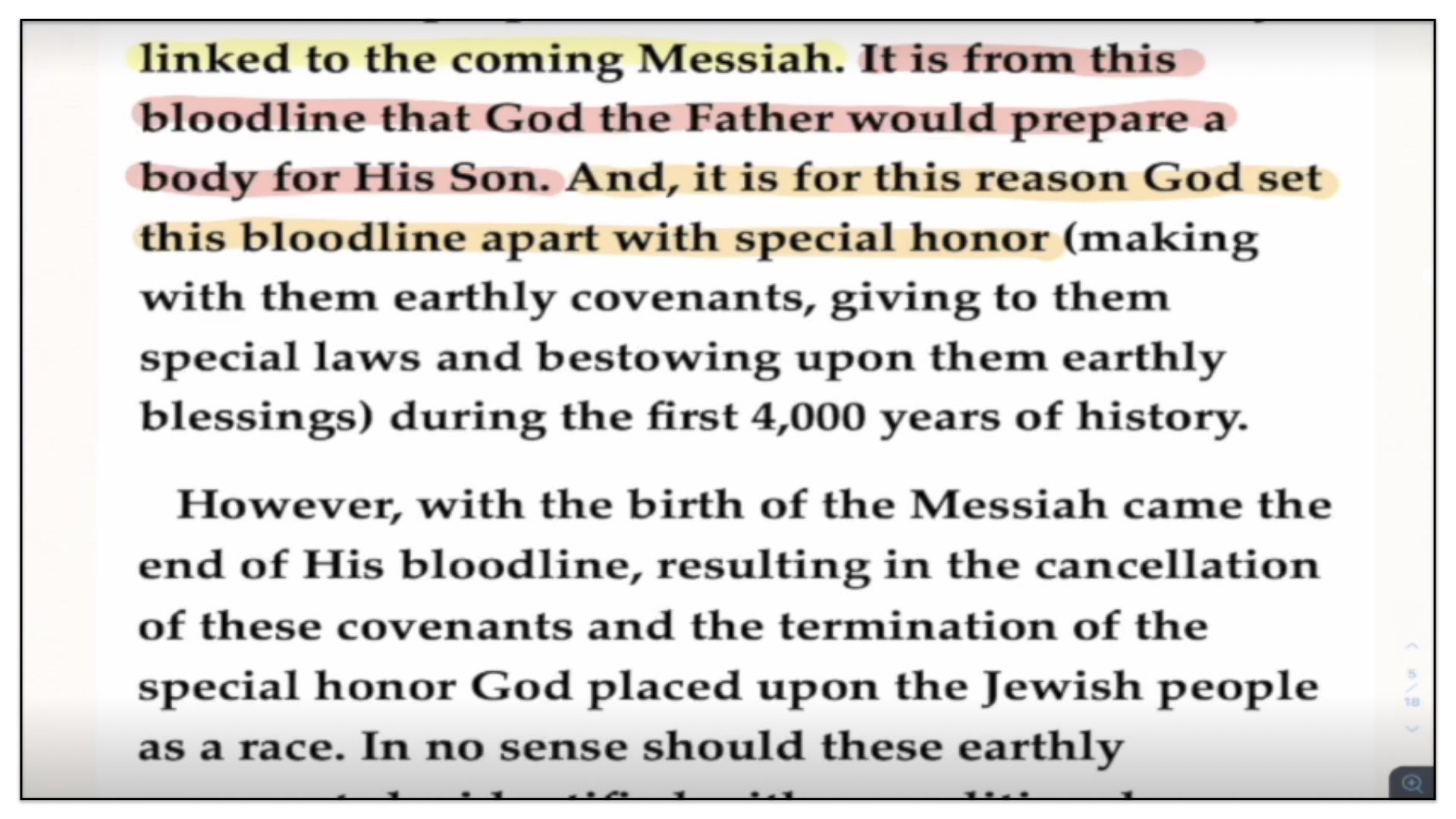
Now, thus far we have covered the first part of this statement and last week we looked at the bloodline of the Jewish race and its significance as God the Father prepared from it a body for His Son. I now would like to pick up in this teaching with the following statement. Watch. “And it’s for this reason God set this bloodline apart with special honor.” Now, I’m going to pause there for just a few moments and emphasize this point. There is no question, the Jewish people as a race were set apart with special honor and were the recipients of many earthly blessings. Of course, their history is recorded by divine inspiration in the Old Testament scriptures.
The Focal Point Of The Old Testament Scriptures Is The Biological Lineage Of The Messiah—Genesis 1-11 Recording The History Of The First 2,000 Years Prior To The Creation Of The Jewish Race; Genesis 12-Malachi 4 Recording The History Of The Last 2,000 Years After The Creation Of The Jewish Race.
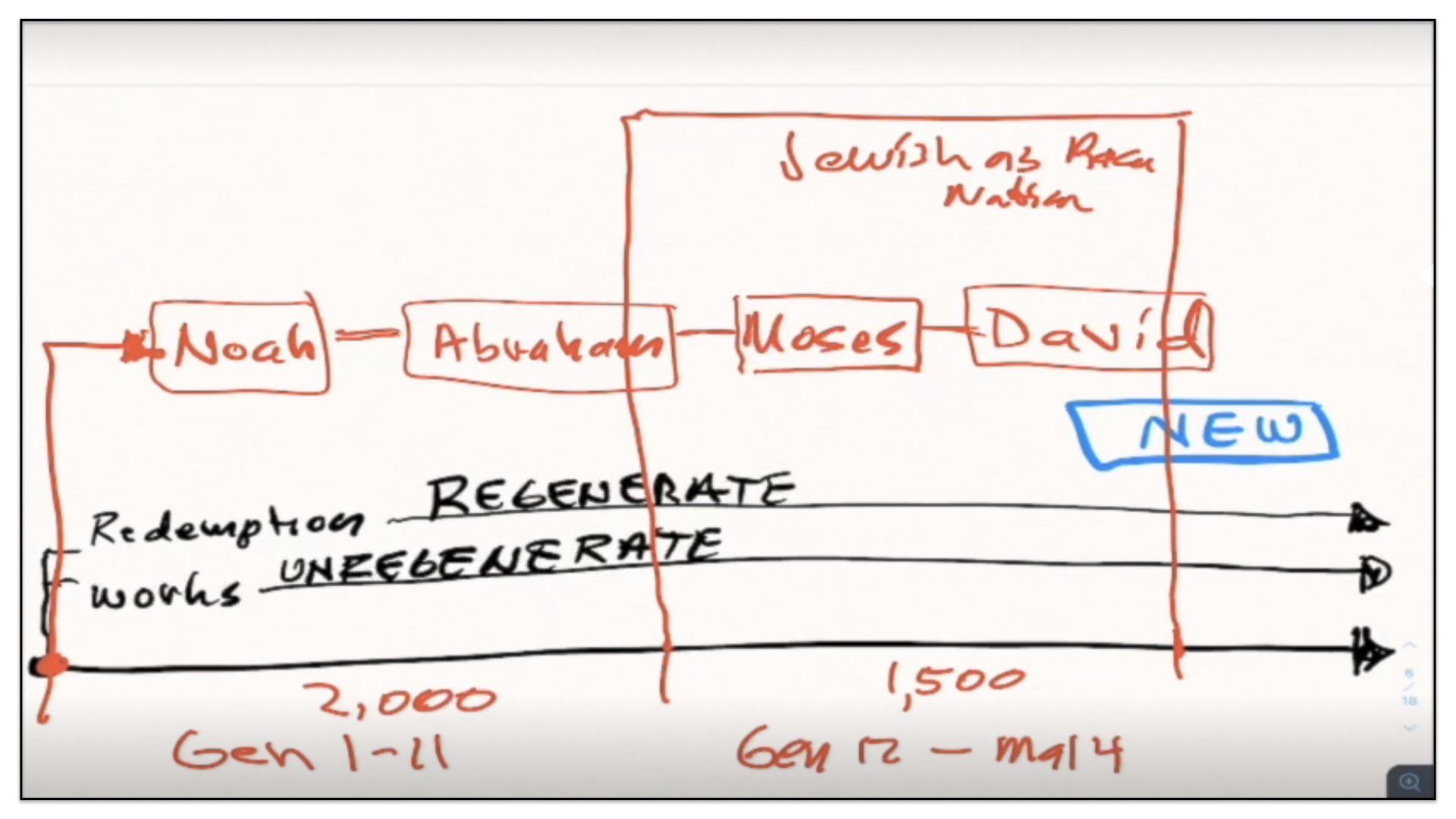
Now it’s telling—and I want to refer you now to a little timeline—it’s telling that the first 2,000 years of history is condensed in the first 11 chapters of Genesis. Isn’t that interesting? If you want to know anything about the first 2,000 years of history, you’ve got to read the first 11 chapters of Genesis. But watch this—the next 1,500 years are recorded from Genesis chapter 12, and it ends at the final chapter of the Old Testament, Malachi chapter 4. I emphasize this point for you because I want you to notice the focal point of the Old Testament scriptures is on the Jewish people as a race and nation. That’s the focal point of the Old Testament scriptures.
Why Did God Create The Jewish Race And Set Them Apart With Special Honor?
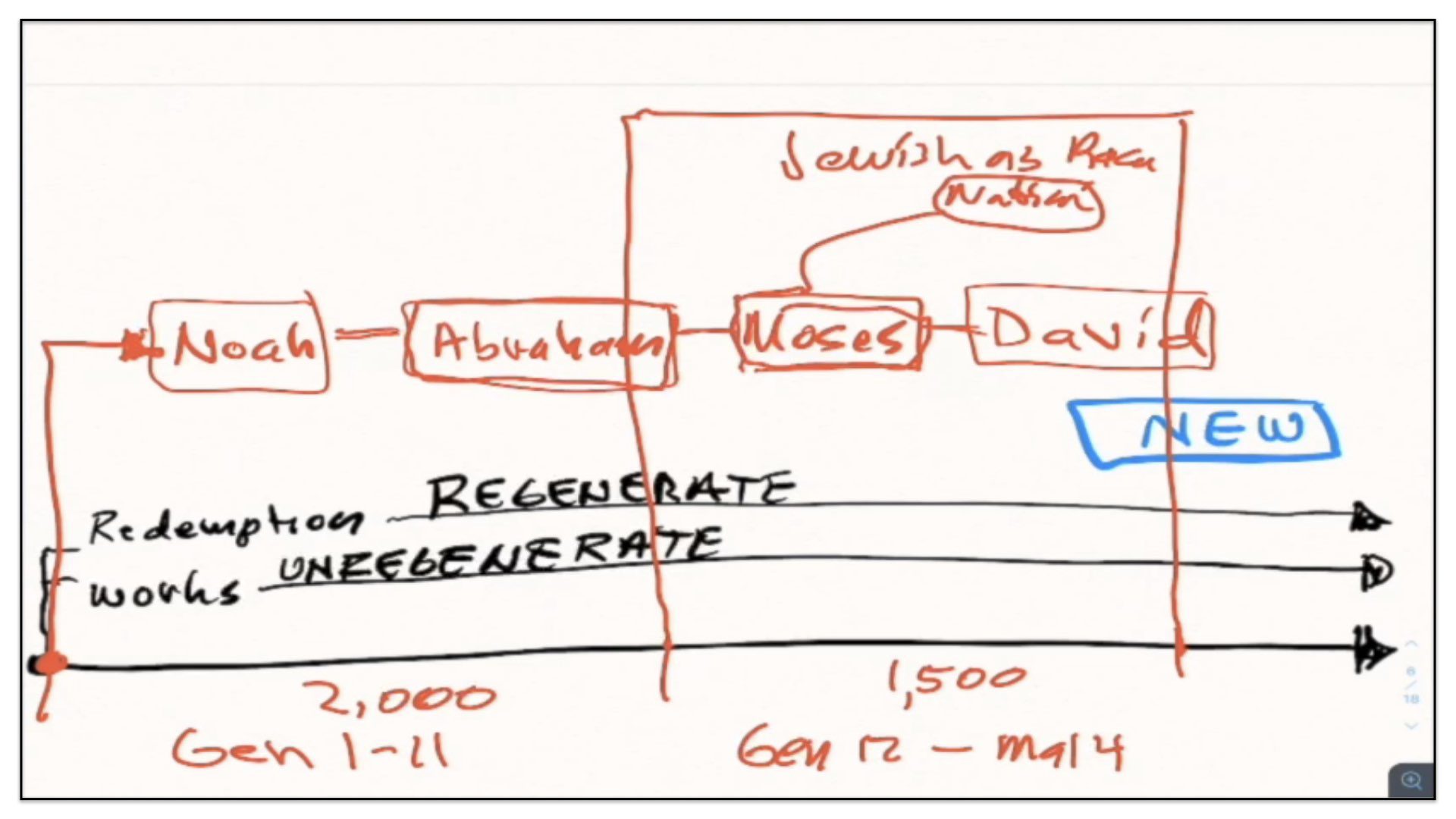
Now, the question is this, why did God create the Jewish people from the loins of Abraham? Why did God make this Jewish people as a race into a nation under Moses? Why did God promise to give the Jewish people a land which flows with milk and honey? For what reason did God distinguish the Jewish race from all the other nations of the earth? This is the big question that I am seeking to answer, and the answer of course, is found in the teachings I’ve been bringing out in the previous weeks and again today. You’ll remember in Genesis chapter 3 and verse 15, God makes the promise to Satan that the Messiah will come into the world, born of a woman. And you see, that’s the reason why God is distinguishing the Jewish people and creating them into a special race.
God Honored The Bloodline Of The Messiah During The First 2,000 Years, Between Adam To Abraham
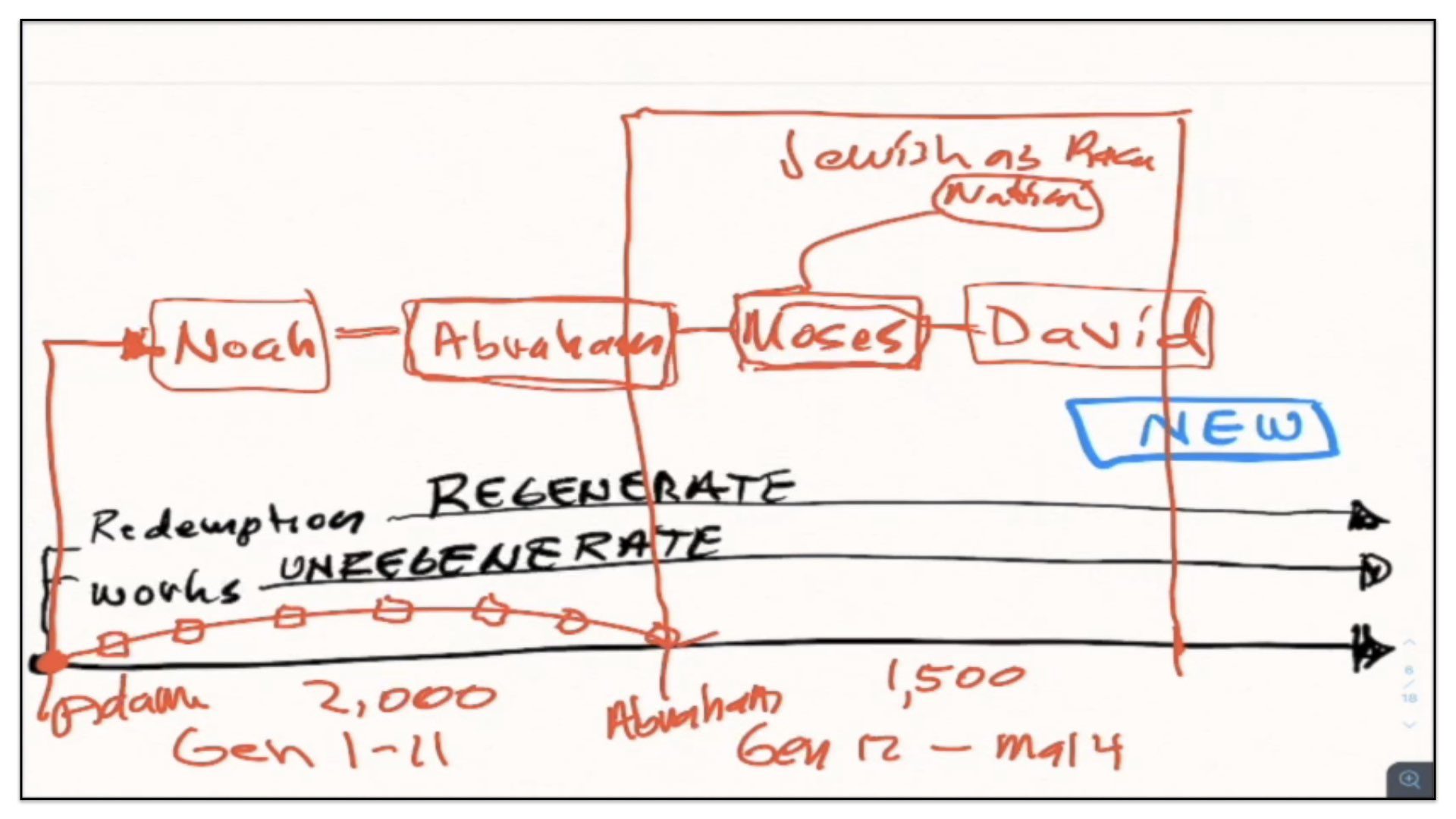
For the first 2,000 years of history, beginning with Adam and then going to Abraham—Abraham was born around the year 2,000 BC—So 2,000 years of history, during this time, the bloodline of the Messiah was greatly honored by God, but He honored them within the context of their individual family units, leading up to Abraham.
God Honored The Bloodline Of The Messiah During The Last 2,000 Years, Between Abraham To The Virgin Mary
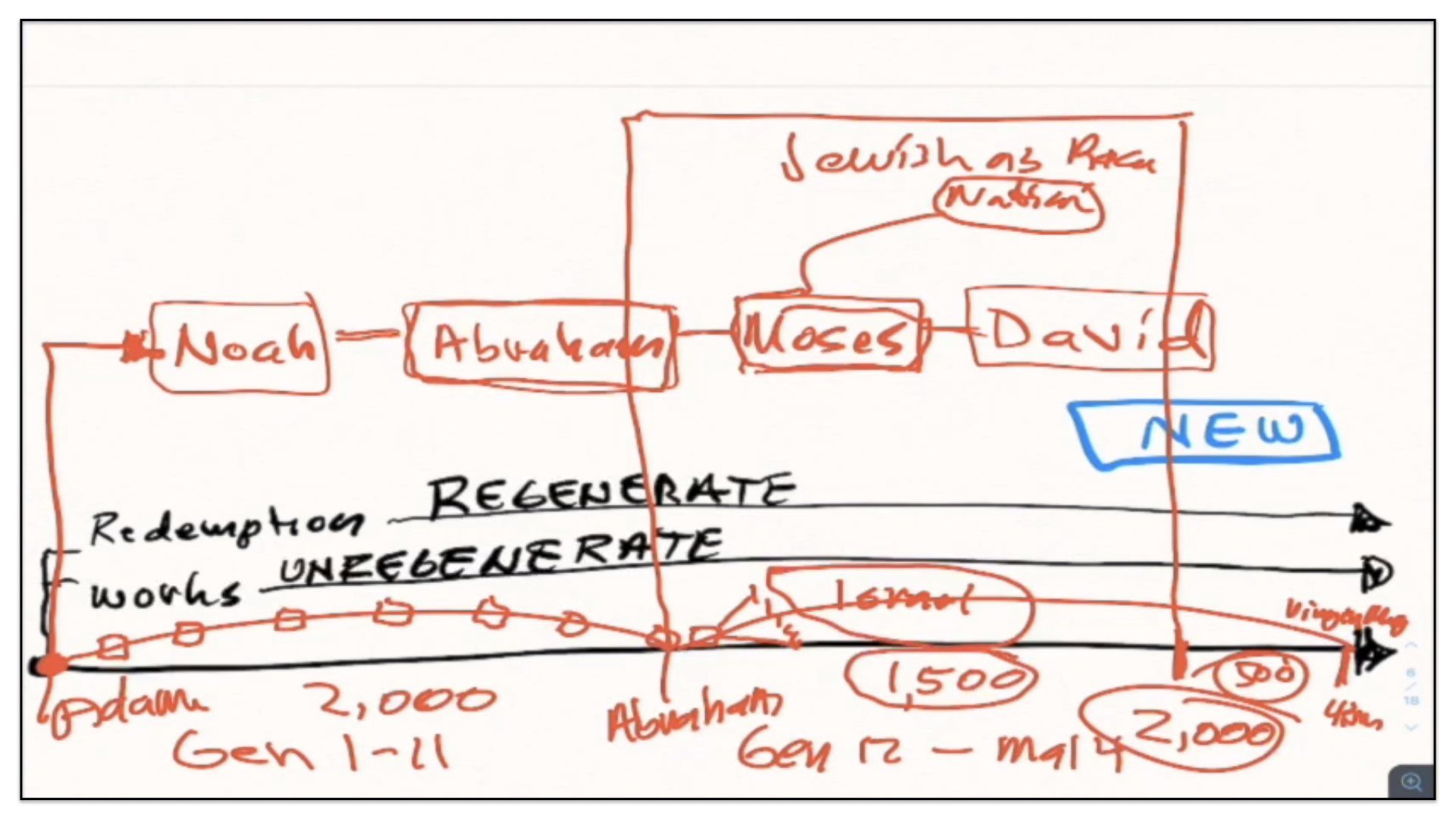
And then for the next 2,000 years—now remember, I’ve distinguished 1500 years between Abraham and Malachi chapter 4 because the Old Testament cannon stops here, but Christ is born in 4 BC, which gives us another 500 years, so all together it’s a total of 2,000 years from Abraham to the birth of Christ—and you see, between Abraham and let’s say the virgin Mary, that’s where the line ends is with Mary. Of course, giving birth to Christ Himself, the Messiah. For those 2,000 years God continues to bless the bloodline only from Abraham, He makes them into tribes (the tribes of Israel, or Jacob), and those tribes become one nation (the nation of Israel, the Jewish people as a nation). And the point that I’m driving at—God is distinguishing this people because they are the family of the Messiah. It’s the Messiah’s family and God is honoring them on that basis.
According To Deuteronomy 7, God Honoured The Jewish People As A Nation Because It Was The Bloodline Of The Messiah
There is a scripture in Deuteronomy chapter 7. I’d like to read it for you. In this passage, we’re going to find reference to God choosing, acknowledging His love for the Jewish people as a race, they are called His chosen or elect people. Let me read for you this passage. Deuteronomy chapter 7 and I’ll commence reading in verse 6—“For thou art an holy people unto the LORD thy God: the LORD thy God hath chosen thee to be a special people unto himself, above all people that are upon the face of the earth. The LORD did not set his love upon you, nor choose you, because ye were more in number than any people; for ye were the fewest of all people: But because the LORD loved you, and because he would keep the oath (the promise) which he had sworn unto your fathers,” Now remember, that would be related to the coming Messiah, the birth of the Messiah. “Hath the LORD brought you out with a mighty hand, and redeemed you out of the house of bondmen, from the hand of Pharaoh king of Egypt. Know therefore that the LORD thy God, he is God, the faithful God, which keepeth covenant and mercy with them that love him and keep his commandments to a thousand generations; And repayeth them that hate him to their face, to destroy them: he will not be slack to him that hateth him, he will repay him to his face. Thou shalt therefore keep the commandments, and the statutes, and the judgments, which I command thee this day, to do them.” And so you see, God placed upon the bloodline of the Messiah great honor and bestowed upon them many blessings.
The Special Honor God Bestowed Upon The Jewish People As A Race And Nation Has Nothing To Do With The Spiritual And Perpetual Covenants, Or That Of Redemption, Salvation And Regeneration
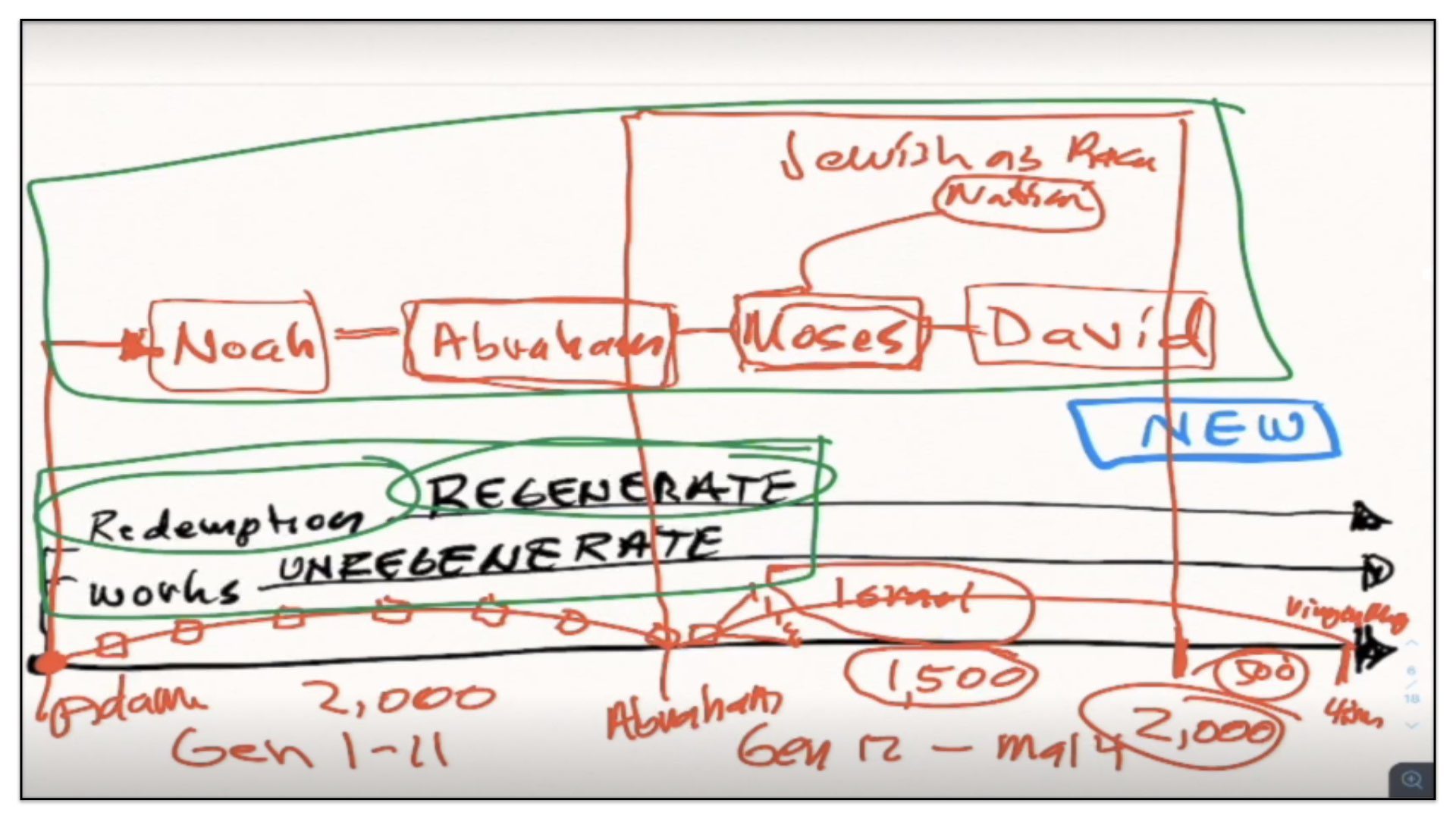
However, in reading this passage of scripture to you, there’s many people who understand this language to be something related to spiritual blessings and privileges and matters that deal with eternal salvation. They hear that the Jewish people are God’s elect people and they somehow think that this is directly connected with redemption and salvation and regeneration. But you see, this is the whole point on separating the biblical covenants and discovering how they fit along a timeline. Referring to these biblical covenants, watch this. There are only two covenants—here, let me change the color pen so we can better see the notes—there are only two covenants which are spiritual and permanent, that of Works and Redemption. And the only covenant that deals with salvation, is that of Redemption. And then there are four earthly covenants. And these covenants are separate from eternal salvation. They’re dealing with things connected to this earth; blessings tied into this earth and specifically related to the coming of the Messiah.
Distinguishing Between The Physically Elect (Jewish People As A Race) And The Spiritually Elect (Sinners Saved By Grace)
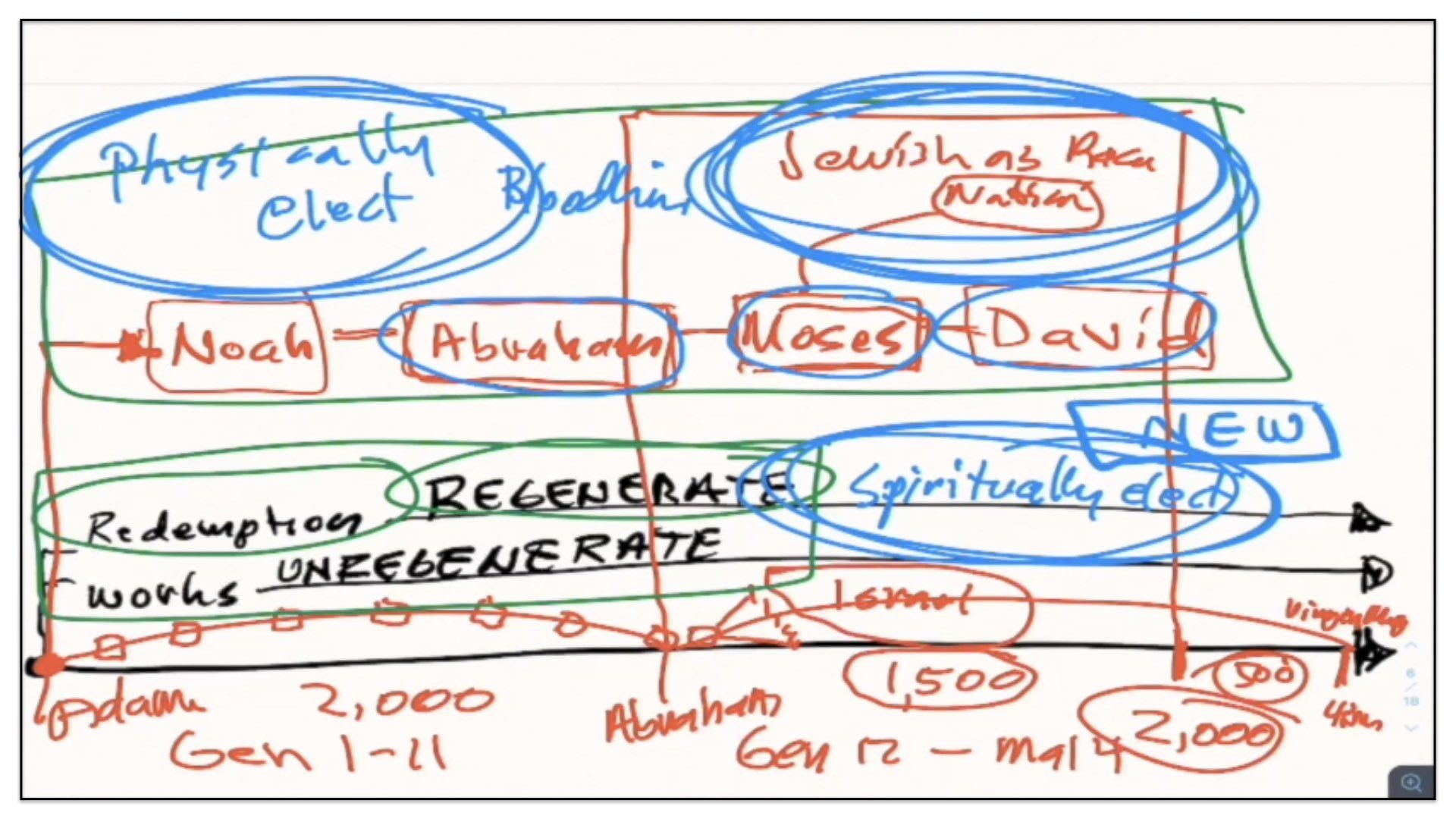
Now you see therefore, it’s important to distinguish between the physically—I’ll just write it down in the notes—the physically elect and the spiritually elect of God. Two entirely separate groups of people. The physically elect are the Jewish race as a people because of their bloodline to the Messiah and they’er put under these earthly covenants. Whereas the spiritually elect people are chosen by the Father from eternity and given to His Son that His Son might redeem them; and then to the Spirit, that the Spirit might sanctify and regenerate them. Now, of course, within the physically elect of God—the Jewish race of people—there were some of them that were also spiritually elect. Well, men such as Noah, Abraham, Moses, David. They were all spiritually elect as well as physically elect, meaning they belonged to the actual family line of the Messiah. But just because they were physically elect, or because they belonged to the Jewish race or the family of the Messiah, did not have anything to do with their eternal salvation. Now that’s the point I want to highlight and underscore for you here. The difference between the physically elect and the spiritually elect.
From Adam To The Virgin Mary, The Messiah’s Family Was Set Apart By God With Special Honor And Governed By Various Covenants In Virtue Of The Fact That They Were Simply The Family Members Of The Messiah—It Was A Privilege Extended To Them Based Squarely Upon Their Biological And Racial Distinctive
Having said that, you may be now asking a very good question—“If these earthly covenants that God made with Abraham, Moses and David had nothing to do with eternal salvation, then why in the world is God bestowing upon them all of this honor and these earthly riches and making with them these covenants? What’s the point? Well perhaps I can answer that—and it’s quite simple to answer—if I were to ask you to think in terms of your own family. Take for instance the charitable spirit we tend to nurture. If for instance your enemy is thirsting, you’ll give your enemy a drink of water. If you’re walking down the street and a stranger has no clothing, you might take off your shirt and give that to him or her to wear. That’s a charitable spirit. But now let’s say the person in need is your brother, or sister, or mother, or father or even a cousin, a son or a daughter. If you find that individual in need, well, you’re going to go the extra mile. What I mean by that, you’re going to invite him or her into your house; you’ll give this person your own bed to sleep in; whatever belongs to you belongs to them. You’ll make sure every one of their needs is met with whatever provisions you have to give to them. Why do you do that to members of your own family? Isn’t it because you have a fierce loyalty to them? Isn’t it true that you show favoritism towards members of your own family? I don’t think there’s anything wrong with that. But if you take that principle and apply it to the Old Testament scriptures, with reference to the Jewish people as a race, I believe that’s precisely what God is doing for the Messiah’s family. The Messiah’s family, from the time of Adam to the virgin Mary, the Messiah’s family was set apart by God and He gave to them special honor. He enriched them with earthly blessings. He established with them specific covenants. He did it all in virtue of the fact that they were simply the family members of the Messiah. Well, enough of that. I hope I made myself clear on these explanations.
The Noahic Covenant—This Is The Only Earthly Covenant God Made With The Messiah’s Bloodline During The First 2,000 Years Of History
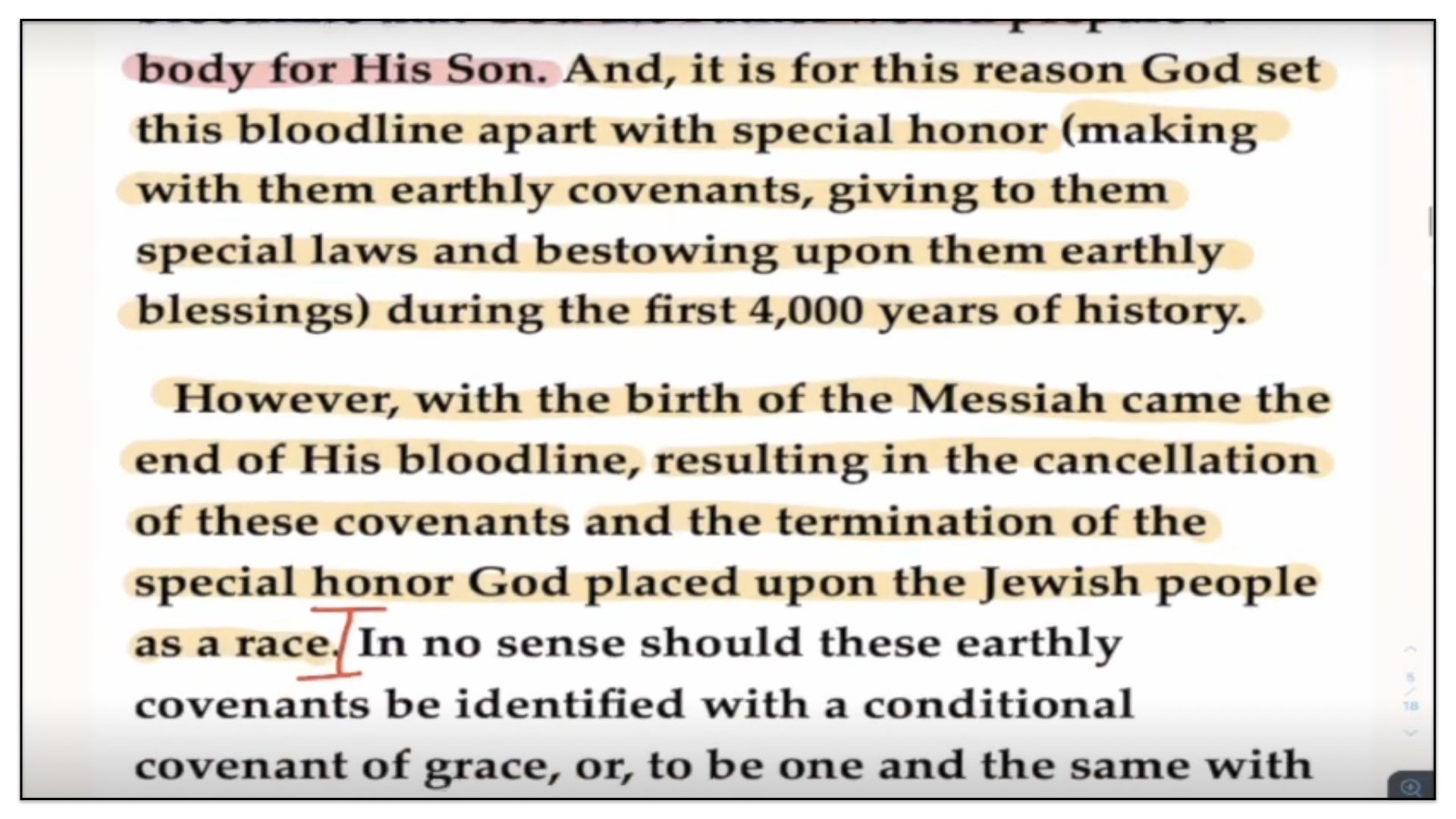
What I want to do is take you back to the summary statement. And for the remaining of our study, I’m going to do my best to begin an explanation on the following points. Watch—“For this reason God set this bloodline apart with special honor, (making with them earthly covenants, giving to them special laws and bestowing upon them earthly blessings) during the first 4,000 years of history. However, with the birth of the Messiah came the end of this bloodline, resulting in the cancellation of these covenants and the termination of the special honor God placed upon the Jewish people as a race or as a nation.” Now it’s going to be at this point we’re going to pause the teachings and I’m going to highlight what I mean by these statements for the remainder of the time we have together.
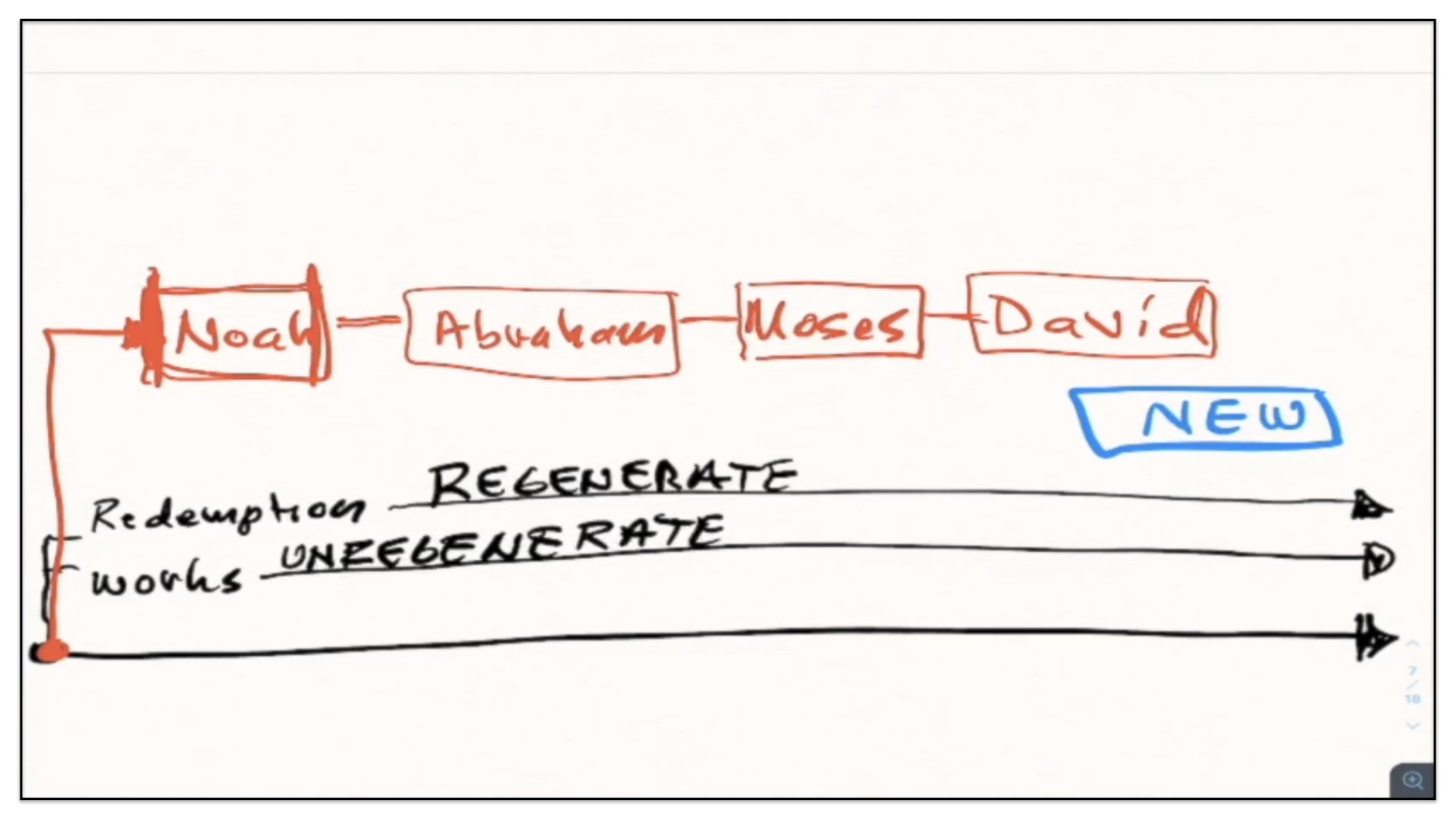
If I take you back to a timeline, let me begin—let me just say I’m going to now focus my attention on one earthly covenant only and I will leave the other three covenants for our study next week; the covenant that I’m going to look at now and for the remainder of this study is the covenant God made with Noah.
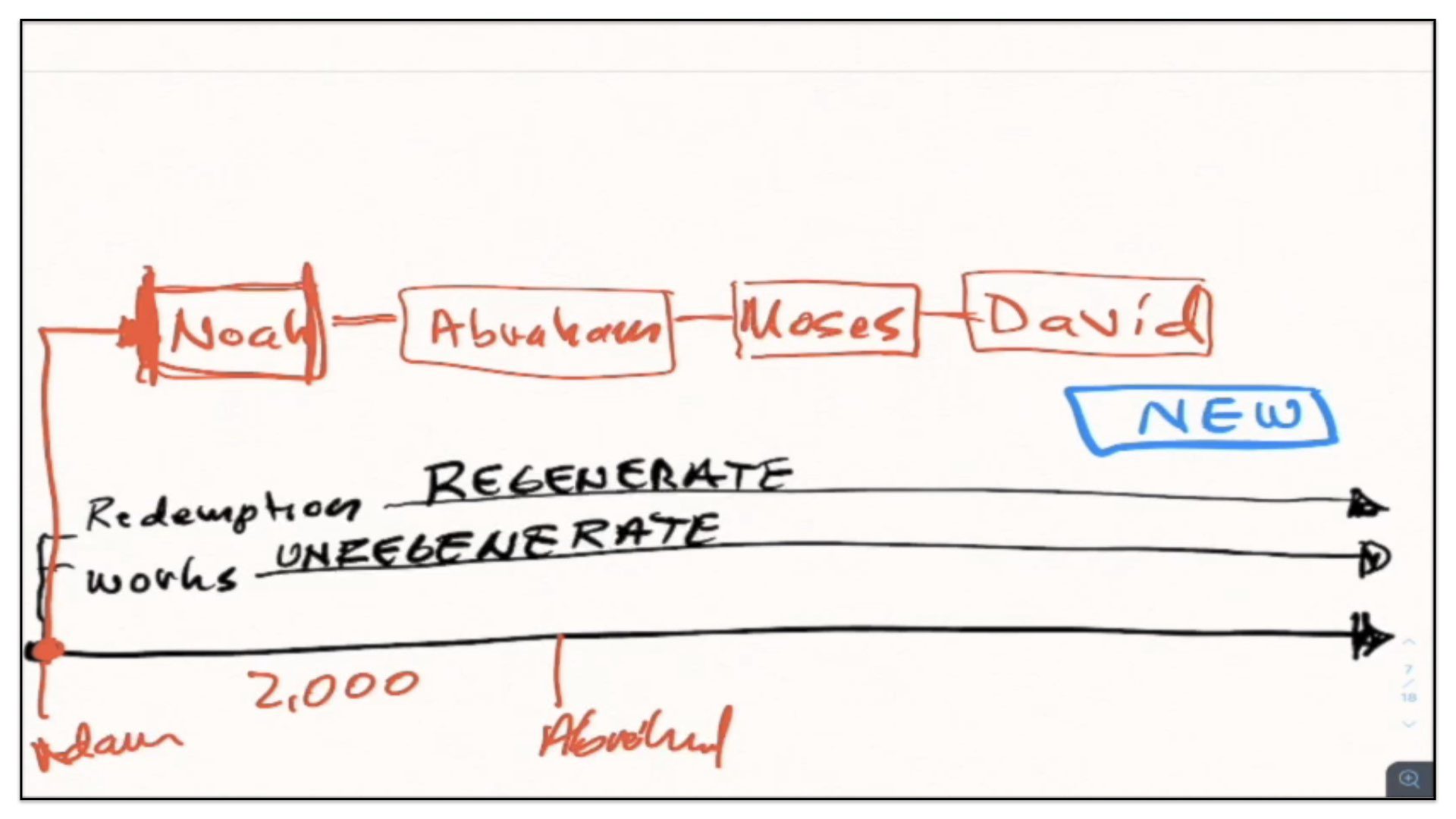
Now watch, during the first two thousand years of history, between Adam and Abraham, God made only one covenant with a member of the Messiah’s family and that covenant was with this man named Noah. Now you’re familiar with the story, Noah and the flood, or Noah and the ark. God sent a worldwide flood and it destroyed the earth and creatures in it. And only those that God placed upon the ark were saved. And I’m now going to read for you the record of the covenant God made with Noah and this will give you the pertinent information when it comes to this particular covenant. We’re looking in Genesis chapter 8 and I want to begin reading for you in verse 20. It’s going to be a lengthy reading. I’m going to go down to the ninth chapter and read to verse 17 and as I read these verses I’d like you to be looking out for the following things: Number one, look out for the laws that God institutes within this covenant; secondly, look for the earthly blessings God is going to promise within this covenant; and third, look at the duration of the covenant. Those are the three things I’d like you to look at. So let’s begin with verse 20:
The Duration Of The Noahic Covenant (Genesis 8:20-22)—It Is Not An Everlasting Covenant
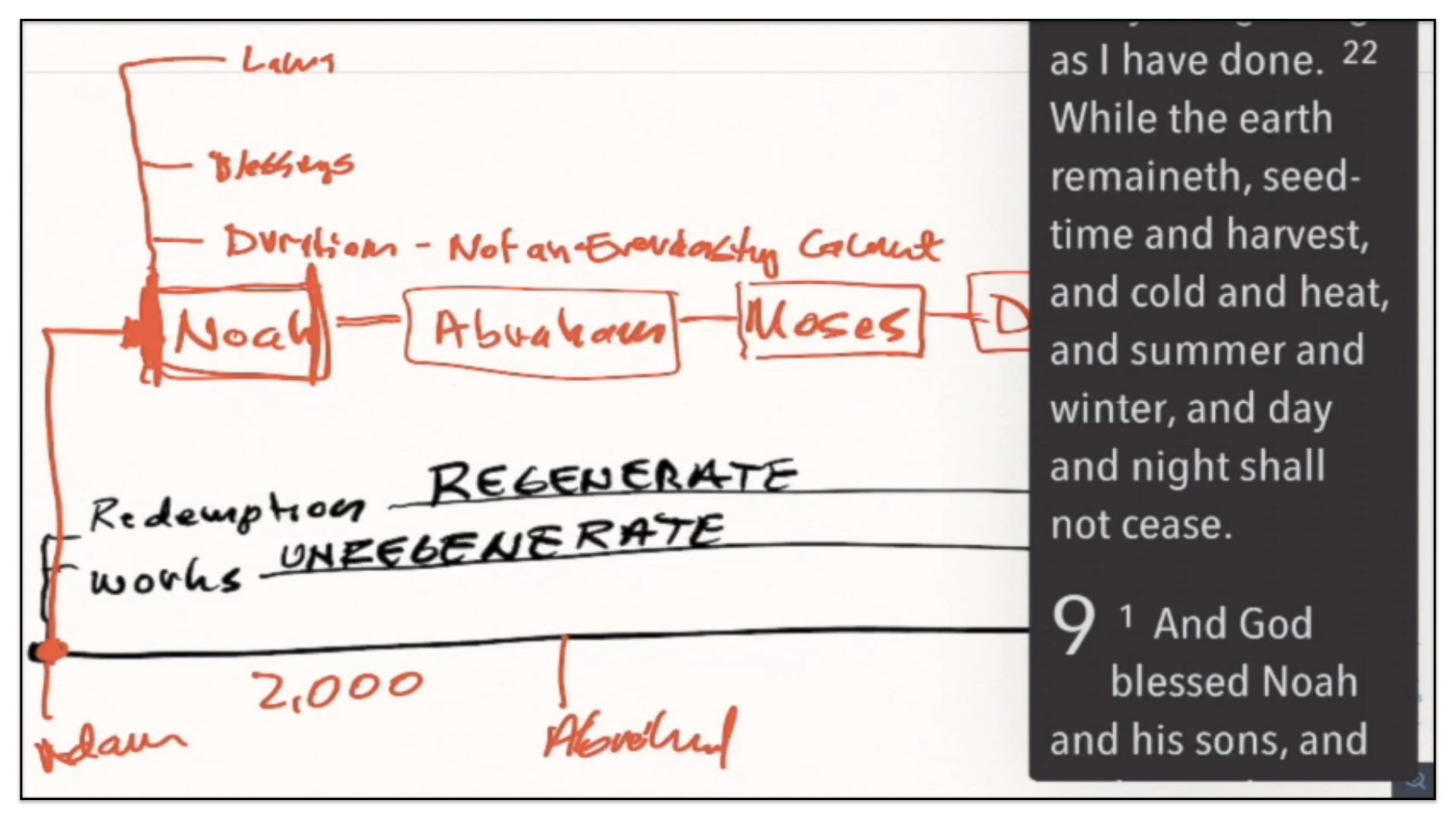
“And Noah builded an altar unto the Lord.” This is after the floods receded and Noah’s Ark landed on dry land. Noah has disembarked from the ark with his family and now he’s building an altar unto the Lord. He “took every clean beast, and every clean fowl, and offered burnt offerings on the altar. And the Lord smelled a sweet savor; and the Lord said in his heart, I will not again curse the ground any more for man’s sake; for the imagination of man’s heart is evil from his youth; neither will I again smite any more every thing living, as I have done.” Now watch here, we have the duration. I guess I might as well just go ahead and make the notes as I read the scripture. There’s going to be three things that we’re going to mark out here—the duration (spell it correctly) the duration of the covenant; the blessings of the covenant; and the laws of the covenant. So we have a little reference now to the duration of the Noahic Covenant. Verse 22, “While the earth remaineth, seedtime and harvest, and cold and heat, and summer and winter, and day and night shall not cease.” Notice the words, “while the earth remaineth”, meaning in its current condition. God will not again destroy the earth with a worldwide flood. So what I’m just going to say, this is not an everlasting covenant. It’s not an everlasting covenant while the earth remaineth. The earth is not always going to remain in its current condition. I’ll have more to say about that in a few moments, but just mark that down for now. This is not an everlasting covenant. It’s only while the earth remains in its current condition.
The Laws Of The Noahic Covenant (Genesis 9:1-7)—(1) Nutrition, Eating Meat; (2) Sanctity Of Human Like, Death Penalty; (3) Procreation, Having Children.
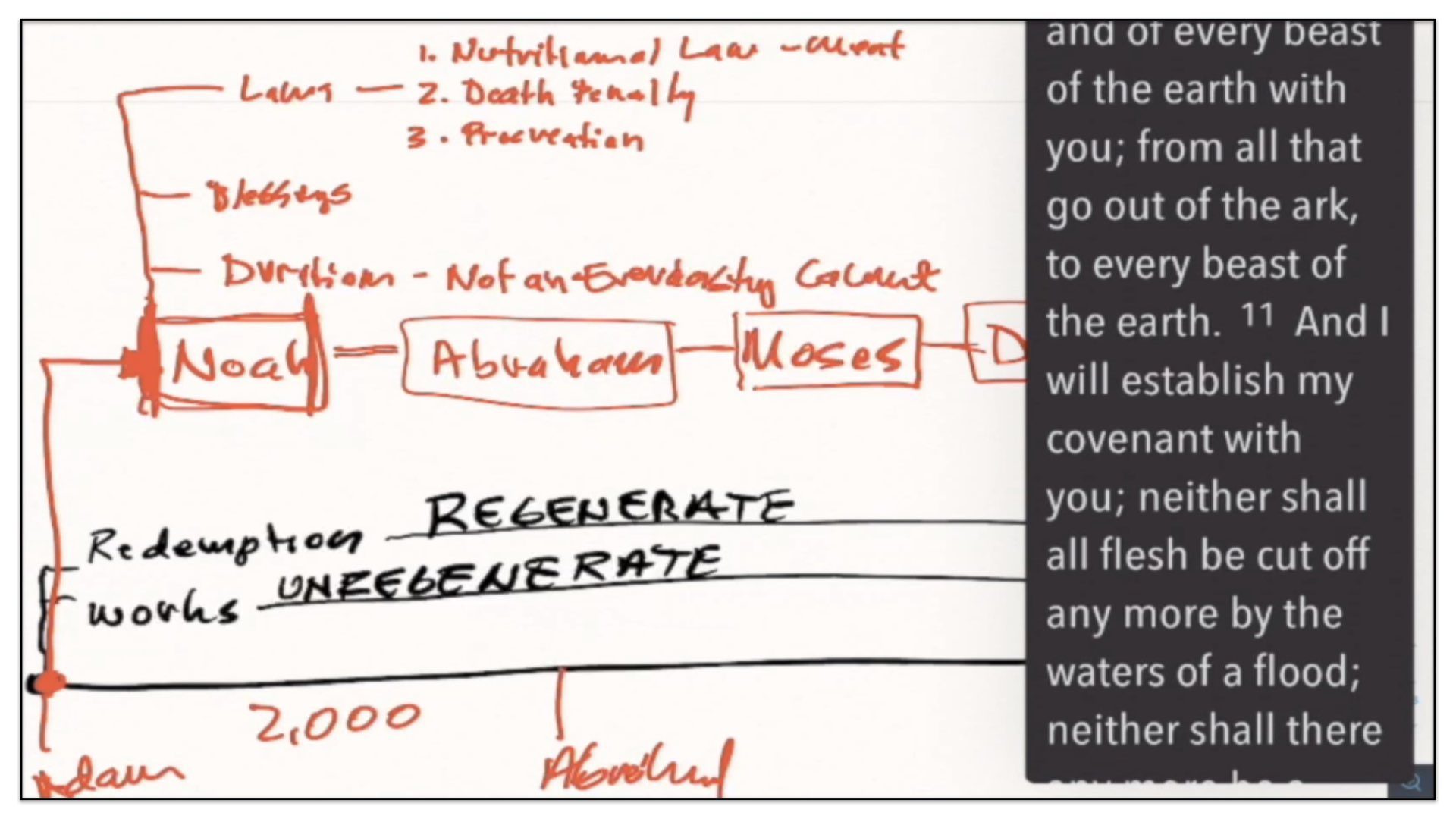
But now look in verse 1 of chapter 9, “God blessed Noah and his sons, and said to them, Be fruitful, and multiply, and replenish the earth.” Well, this comes down under one of the laws and I’m just going to put this as law three, even though it’s the first one mentioned. Law three. And this is what we’re going to call it—procreation, multiplying, having children, in other words. I’ll continue reading. Verse 2, “And the fear of you and the dread of you shall be upon every beast of the earth, and upon every fowl of the air, upon all that moveth upon the earth, and upon all fishes of the sea; into your hand or they delivered. Every moving thing that liveth shall be meat for you; even as the green herb have I given you all things.” So let’s mark down as the first law in this list—it’s going to be a nutritional law. And the nutritional law is being able to eat meat. Verse 4, “But flesh with the life thereof, which is the blood thereof, shall ye not eat. And surely your blood of your lives will I require; at the hand of every beast will I require it, and at the hand of man; at the hand of every man’s brother will I require the life of man. Whoso sheddeth man’s blood, by man shall his blood be shed: for in the image of God made he man.” And we’re going to mark down as the second law here the death penalty. “And you,” verse 7, “Be fruitful, and multiply;” see, there it is again, to have children.
The Blessings Of The Noahic Covenant (Genesis 9:8-17)—A Flood Of Waters Will Not Again Destroy The Earth
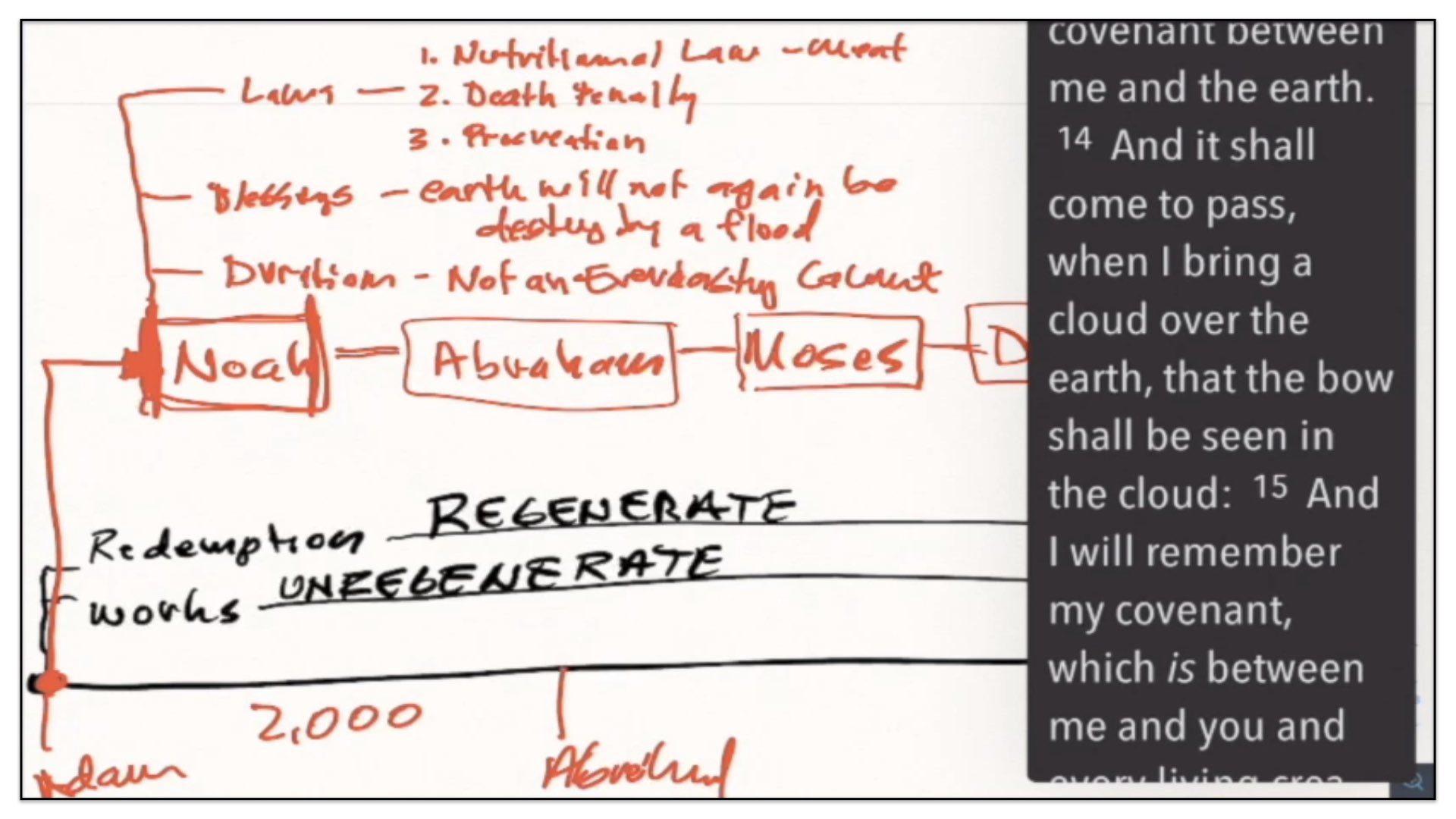
“Bring forth abundantly in the earth, and multiply therein. And God spake unto Noah, and to his sons with him, saying, And I, behold, I establish my covenant with you, and with your seed after you; and with every living creature that is with you; of the fowl, of the cattle, of every beast of the earth with you; from all that go out of the ark, to every beast of the earth. And I will establish my covenant with you; neither shall all flesh be cut off any more by the waters of a flood to destroy the earth.”So what are the blessings here? How do I put this? The earth will not again be destroyed by a flood of waters. Verse 12, “God said, this is the token of the covenant which I make between me and you and every living creature that is with you, for perpetual generations: I do set my bow in the cloud, and it shall be for a token of a covenant between me and all the earth. And it shall come to pass, when I bring a cloud over the earth, that the bow shall be seen in the cloud: and I will remember my covenant which is between me and you and every living creature of all flesh; and the waters shall no more become a flood to destroy all flesh. And the bow shall be in the cloud; and I will look upon it, that I may remember,”
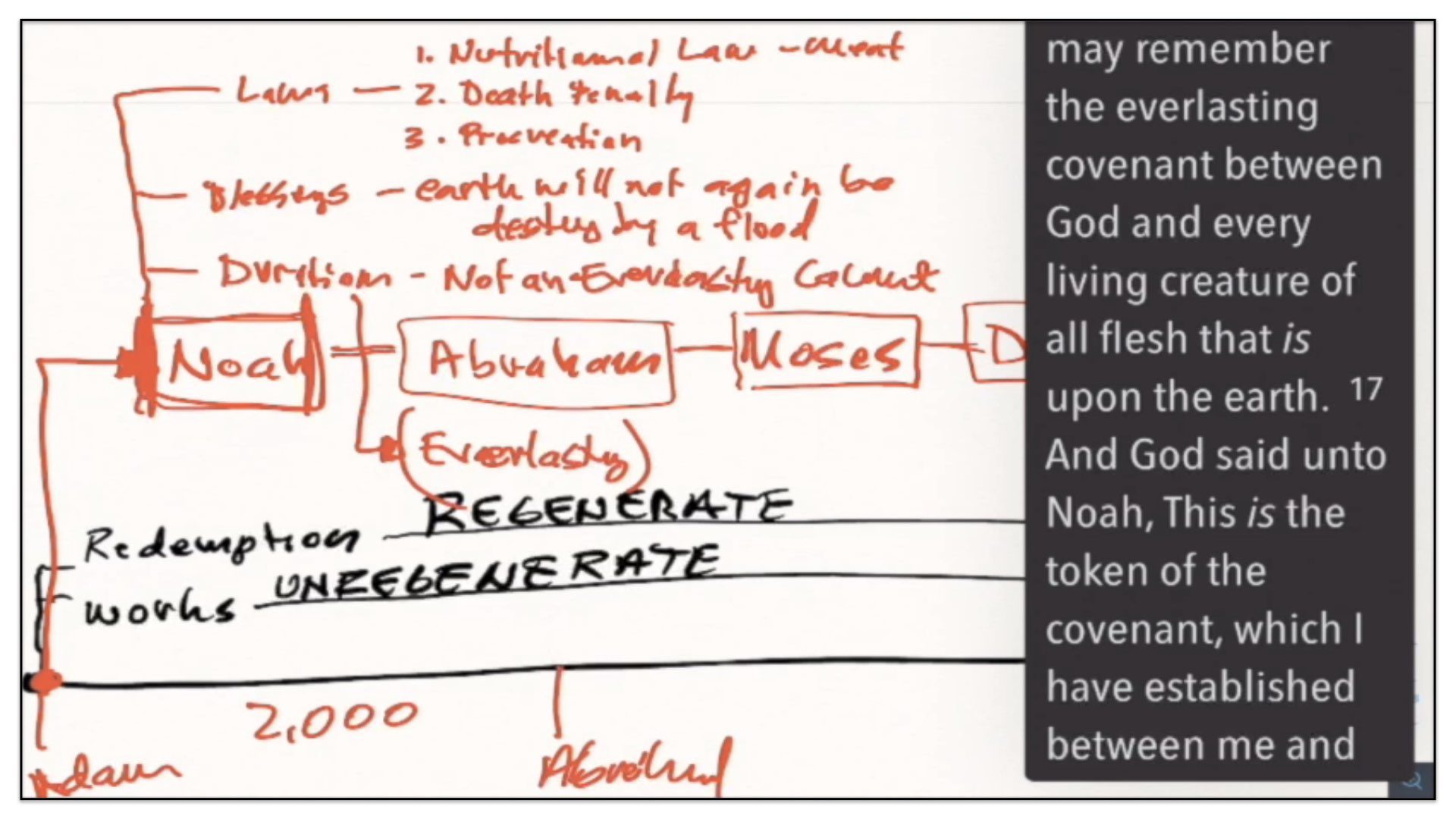
Ah, watch these words, “The everlasting covenant between God and every living creature of all flesh that is upon the earth.” This is connected with the duration—notice how God calls this an everlasting covenant; I’m going to come back to that in a moment—but that deals with its duration. “And God said unto Noah,” verse 17, “This is the token of the covenant which I have established between me and all flesh that is upon the earth.”
Reviewing The Laws, Blessings And Duration Of The Noahic Covenant
The Laws Of The Noahic Covenant (Genesis 9:1-7)—(1) Nutrition, Eating Meat; (2) Sanctity Of Human Like, Death Penalty; (3) Procreation, Having Children
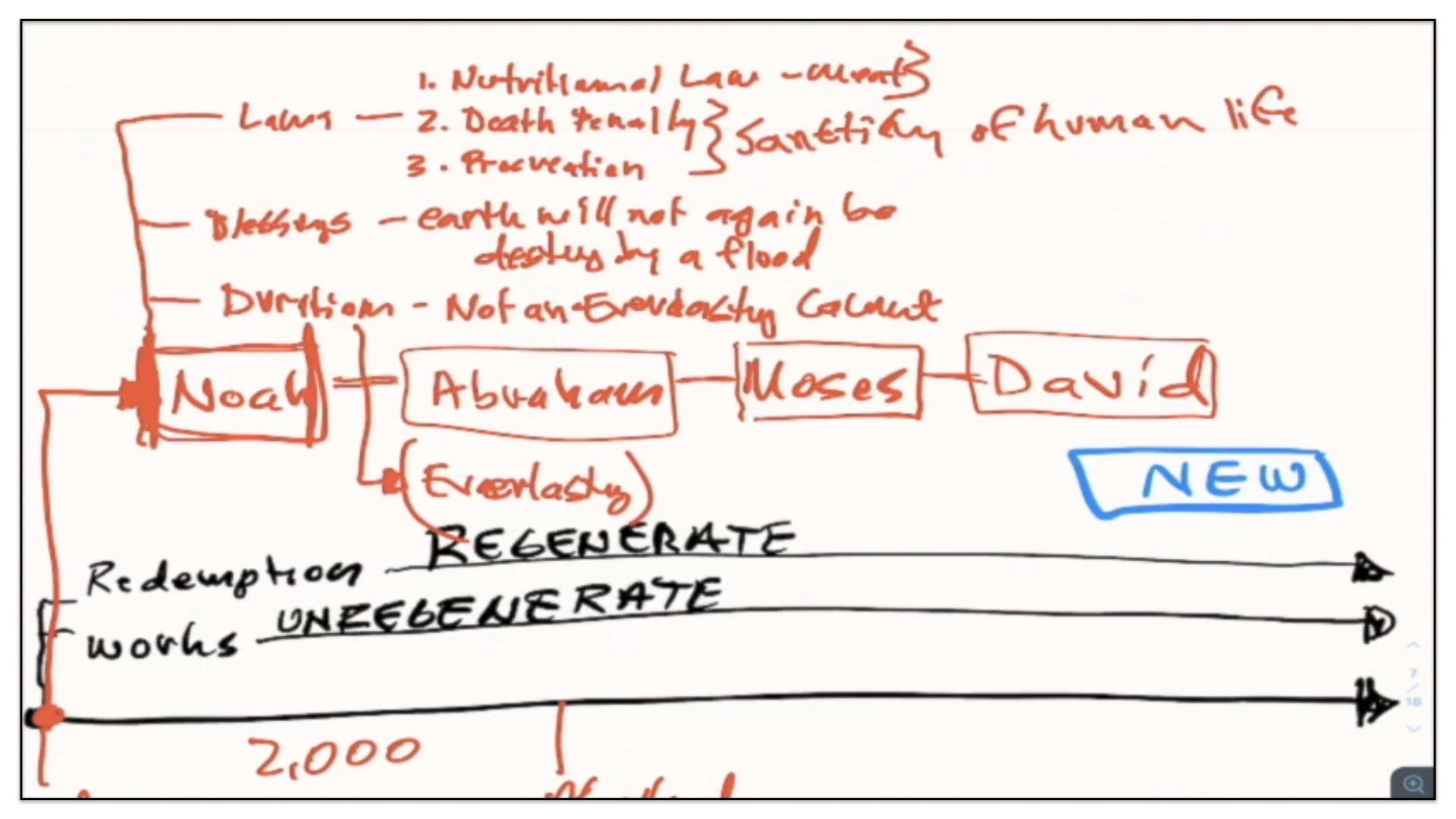
Well, that’s the reading and I’ve already highlighted for you the major points of the passage. But now, let me just underscore them again. Watch. Under the terms of this covenant, the laws of this covenant—God gave two basic laws. I’ve highlighted three of them, but they’re actually in two categories. The first is what’s called nutritional sustenance, or nutritional laws for the human race. They would now be able to eat meat. The second set of laws is what could be called the sanctity of human life and the sanctity of human life comes under these two headings: the death penalty and procreation. The sanctity of human life would be preserved by the death penalty, meaning that if a man or beast were to take the life of an individual human, then that beast or human guilty of murder would be put to death. That is to set straight the knowledge that humans are made in the image and likeness of God. Let me pause here and emphasize this point on the sanctity of human life. Remember in Genesis chapters 1 and 2, God made all the animals of the earth. He made them physical beings. But when He made man, He took from the dust of the ground and made his body just like the other animals, but then He did something to the man to distinguish him from all other animals. God breathed into his nostrils the breath of life and Adam became a living soul, meaning his soul (a spirit being) now indwelt the tabernacle of his body and that soul was in union with God. That’s what it means to be a living soul in union with God. This is before Adam sinned. And that’s what it means to be made in the likeness and image of God. And the image of God refers to a spirit being. God is a spirit being and we that have a personal relationship with Him must be of like kind. We must be a spirit being. And to be made in the likeness of God means that God is righteous and holy and when God made Adam He made Adam’s soul righteous and holy. Now, Adam lost that likeness. He never lost the image. Adam remained a spirit being. All humans are spirit beings. But Adam lost the likeness of God when he sinned, for he was cut off from God. His soul therefore became dead in trespasses and sins, no longer a living soul, but now a dead soul, and Adam was now totally depraved. Sinful, unlike God. Now I say all of this to you because when it comes to the death penalty, God is laying down a law to say, “Listen, human life is not animal life. You can slaughter a pig and eat its meat, but you can’t slaughter a human being and eat that meat.” Human beings are made in the image of God, and they are sacred in that sense. And that’s the preservation of the sanctity of human life in society. The promotion of the sanctity of human life comes in procreation, having children. And you see, what I find interesting is that all of these laws are now either undermined or violated today. I mean, animal life is often viewed today as sacred, if not more sacred, than human life. Isn’t that sad? The death penalty is denounced by many people across the world. And procreation is either discouraged by environmentalists lest we overpopulate the earth, as if God doesn’t know how many people He’s going to bring into the world through procreation; as if God hasn’t created a world big enough to house all of the people. He has! God gave the command to procreate. But people are wise in their own conceit, you see, and so they want to hinder and discourage people from having children and families. And then there’s others that’s even worse than that. Selfish women, who for their own agenda, reasons, abort, kill, murder their unborn children. That’s not procreation. That’s a violation of these laws. To kill an unborn child is murder. It’s to murder a human being, one made in the image of God. That’s the sanctity of human life, you see. So procreation is a large part of the laws God had given to Noah under this covenant.
The Blessings Of The Noahic Covenant (Genesis 9:8-17)—A Flood Of Waters Will Not Again Destroy The Earth

Now, I want you to notice, when it comes to the blessings of this. So we looked at the laws when it comes to the blessings of this covenant, quite simply God pledged to not again destroy the world by a flood. But as I pointed out to you in verse 22 of chapter 8, so long as the earth remains in its current state—seed time and harvest, cold and heat, summer and winter, night and day will not cease, so long as the earth remains in its current condition. Now remember, God had just destroyed the earth by a worldwide flood. And so this covenant God makes with Noah and the pledge He gives to Noah comes on the heels of that event. And of course, the blessings of this covenant extend beyond the bloodline of the Messiah. So it goes from Noah—this is about 1600 years after the creation of the world that the flood occurred—so from this point, the covenant continues to the birth of Christ in 4 BC, but it continues even now today in 2022, and it will continue even beyond this day, so long as the earth remains in its current condition. But then the question rises, when will this earth end and its current condition?
The Duration Of The Noahic Covenant (Genesis 8:20-22)—It Is Not An Everlasting Covenant
The Meaning Of The Word “Everlasting”
Well, that takes us to the duration of this covenant and I want to say to you, this covenant is not an everlasting covenant. It will not continue forever. It will come to an end. “But wait a minute,” you ask, “I thought we just read from the text God Himself identifying this as an everlasting covenant. Well, what do you do with that language?” Well, let me try to explain it to you like this. This term “everlasting” can have one of two meanings. Let me change the color pins so you can see the notes I make on the screen. Watch. I’ll just make the notes here. This word everlasting can have one of two meanings.
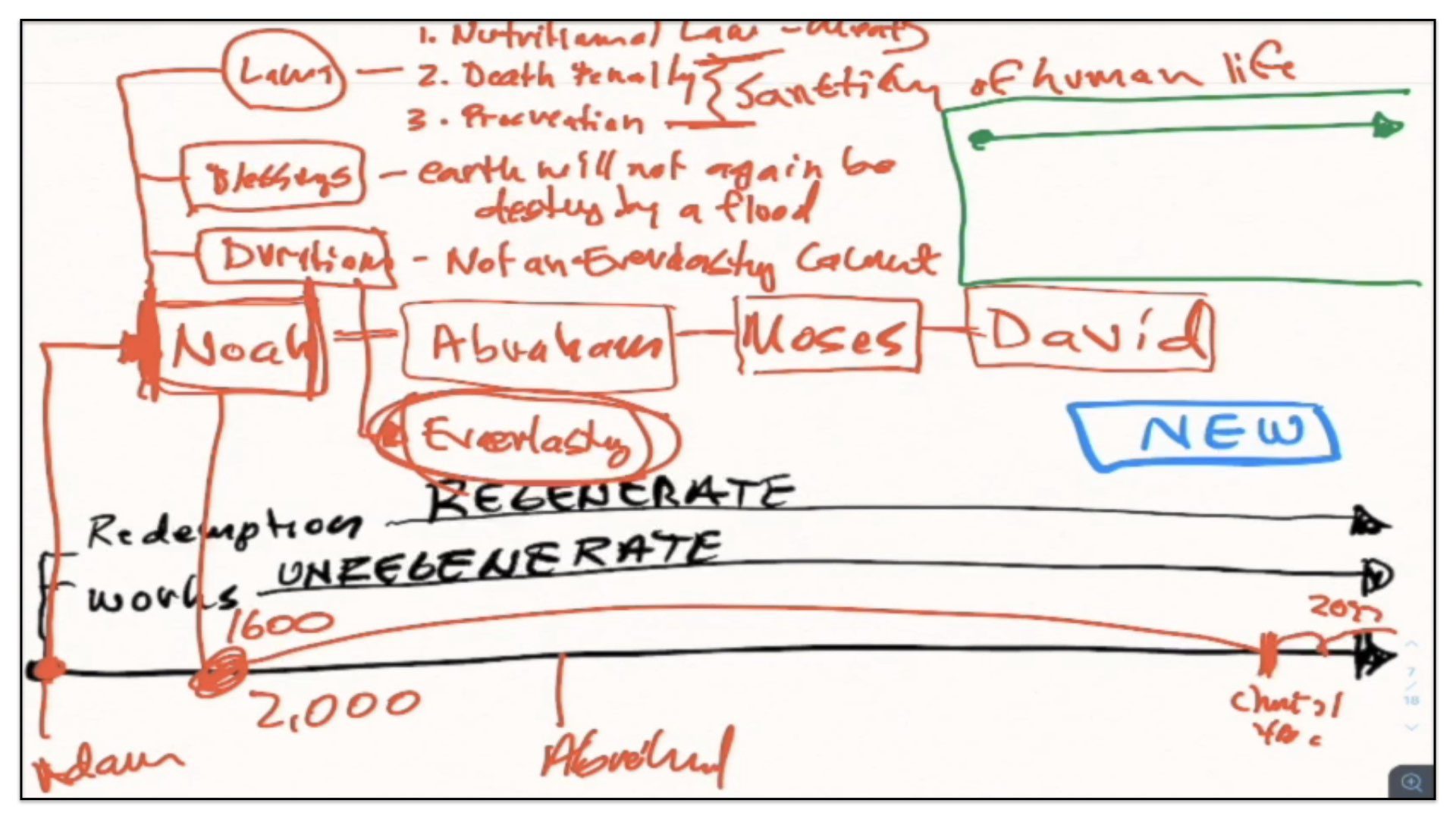
It could have this meaning: It means there’s a beginning point and it will continue forever. There’s no absolute end. And in this sense the word everlasting is truly perpetual. It’s ongoing. However, there’s another way the term is used.
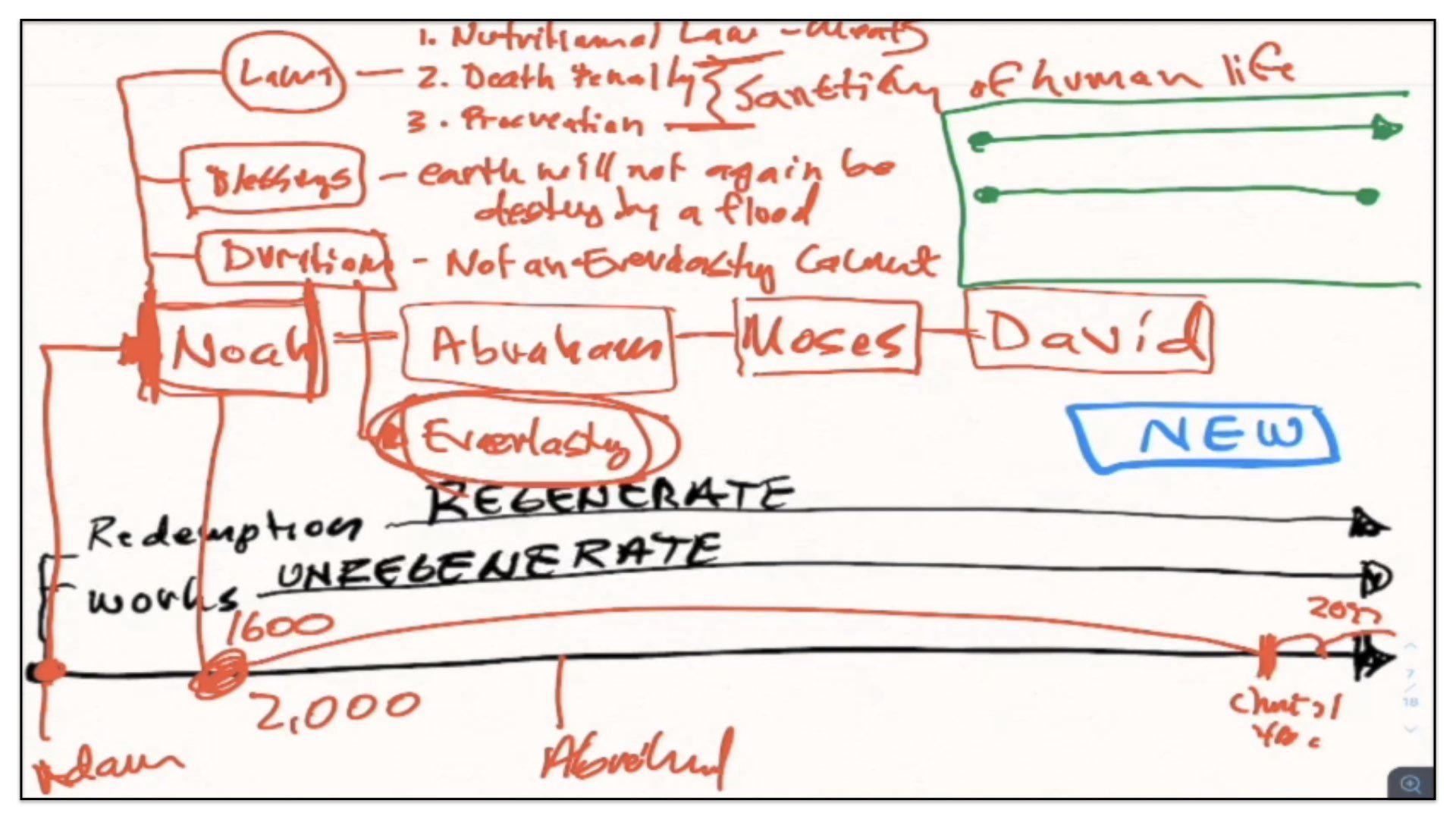
It could mean that it has a beginning point and it has an end point, and it will continue until it’s end point. It’s everlasting until the end of this thing is accomplished. Let me give an illustration of this. So I just referred to animals and humans. This is a good illustration. So when animals die, they are only physical beings and their body returns to the earth from whence it was taken and that’s the end of the animal life. There is no soul that goes on to the next life. Animal life is everlasting in the sense that it will live on this earth as long as God gives it that blessing to live. But once the animal dies, that’s it. Whereas when humans die, the body returns to the ground from which it was taken, but the soul is everlasting. It goes on. There is no end. So there’s a sense in which animal life is everlasting to a point, till it dies. But there’s another sense in which human life is everlasting, meaning it will never die. The soul and even the body that God will reunite with the soul at His second coming, that body will also continue in the world to come after the resurrection.
Here’s another simple illustration for you, perhaps a little bit more practical. Take, for instance, a contract you might sign with a place of employment. The contract is only for three years. There’s a beginning date and there’s an end date. Nothing can break or violate that agreement. The only time the agreements going to terminate is at the end of those three years. From one sense, you could say that that’s a temporary covenant, meaning that it has an end point. It’s not going to keep on going. But from another sense, you could say it’s an everlasting covenant, a perpetual covenant, meaning this: That when you enter that agreement, nothing is going to violate the agreement that can bring it to an end except for the end date of the agreement. Only after three years will that covenant come to an end. And you see, it’s in that sense that the Noahic Covenant has been established by God with Noah. It has a beginning point with Noah and it has an end point.
The End Point Of The Noahic Covenant—The Second Coming Of Christ, When The Earth Will Be Destroyed By A Worldwide Fire (2 Peter 3:3-13)
What’s the end point for the Noahic Covenant? Well, we read of this in the letter of Peter. The second letter of Peter. Let me read this for you. We’re looking in second Peter and we’re going to be looking in chapter three. I’m gonna read several verses from the chapter to you, and as I read, consider what I read in connection with what I’ve just explained concerning the Noahic Covenant. Watch. Peter writes—“Knowing this first, that there shall come in the last days scoffers, walking after their own lusts, And saying, Where is the promise of his coming?” The promise of who’s coming? The coming of the Messiah. But wait, the Messiah had already come by the time Peter writes these words. Well you see, Peter wasn’t referring to the first coming of the Messiah. He’s not talking about the birth of the Messiah. He’s talking about the second coming of the Messiah. The return of the Messiah. So there’s going to be many people, Peter says, that’s going to say, Where is this promise of the Messiah’s return? “For since the fathers fell asleep (or died), all things continue as they were from the beginning of the creation.”Ah, remember the words of God in Genesis chapter 8 verse 22, as all things continue as they are the Noahic Covenant will be active. And so we have that language here—“all things continuing as they are.” Verse 5, “For this they willingly are ignorant of, that by the word of God the heavens were of old, and the earth standing out of the water and in the water.” This is a reference now to the flood. “Whereby the world that then was, being overflowed with water, perished. But the heavens and the earth, which are now, by the same word are kept in store, reserved unto fire.” Things are continuing exactly as they are—seed time and harvest, heat and cold, etc. “against the day of judgment and perdition of ungodly men.” There is coming a day when things as they currently exist will end. Verse 8, “But, beloved, be not ignorant of this one thing, that one day is with the Lord as a thousand years, and a thousand years as one day. The Lord is not slack concerning his promise, as some men count slackness; but is longsuffering to us-ward, not willing that any should perish, but that all should come to repentance.” Now, many people take these words and they say, “Well, there’s the free will of man and God’s desire for the entire human race to be saved.” That’s not the meaning of this at all. God’s desire during the days of the flood was for the entire human race to be destroyed, except for eight souls. And those eight souls were saved by God. Some we know for sure were saved eternally. Others may have just been saved physically from that flood. We’re not sure of their testimonies, of Noah’s household, of all of them. However, the point being, that God’s desire that not all should perish, but should come to repentance, this must be a reference to His elect people. God is not going to bring any judgment upon this world until all of His elect people have come into existence and have been regenerated by the Spirit of God. Until that happens the world will continue as it is. Verse 10, “But the day of the Lord will come.” Things will end. “As a thief in the night; in the which the heavens shall pass away with a great noise, and the elements shall melt with fervent heat, the earth also and the works that are therein shall be burned up.” Oh, those environmentalists that like to fear-monger. They tell us that we have a hundred years left before the earth will no longer be habitable. They don’t know and they’re guessing. And we have the promise of God that the earth will continue for another thousand years if He pleases because it will only end, on this day, this day of judgment, this day when God will bring a judgment of fire that will consume the heavens and the earth and the seas. It will burn them up. You talk about the fear of global warming. The environmentalist have never envisioned a global warming that has been promised by God, that is coming on this day of judgment. Verse 11, ”Seeing then that all these things shall be dissolved,” the world as we know it will come to an end. “what manner of persons ought ye to be in all holy conversation and godliness, Looking for and hasting unto the coming of the day of God, wherein the heavens being on fire shall be dissolved, and the elements shall melt with fervent heat? Nevertheless we, according to his promise, look for new heavens and a new earth, wherein dwelleth righteousness.”
Don’t you see in the reading of these words of Peter, the covenant God made with Noah secures for the entire human race the earthly blessings we now enjoy in the world. And nothing shall break this covenant God has made. It’s everlasting, until the last day, the day of God, the day of the Lord, the day of judgment, the day of Christ’s second coming. It all points to the second coming of Christ.
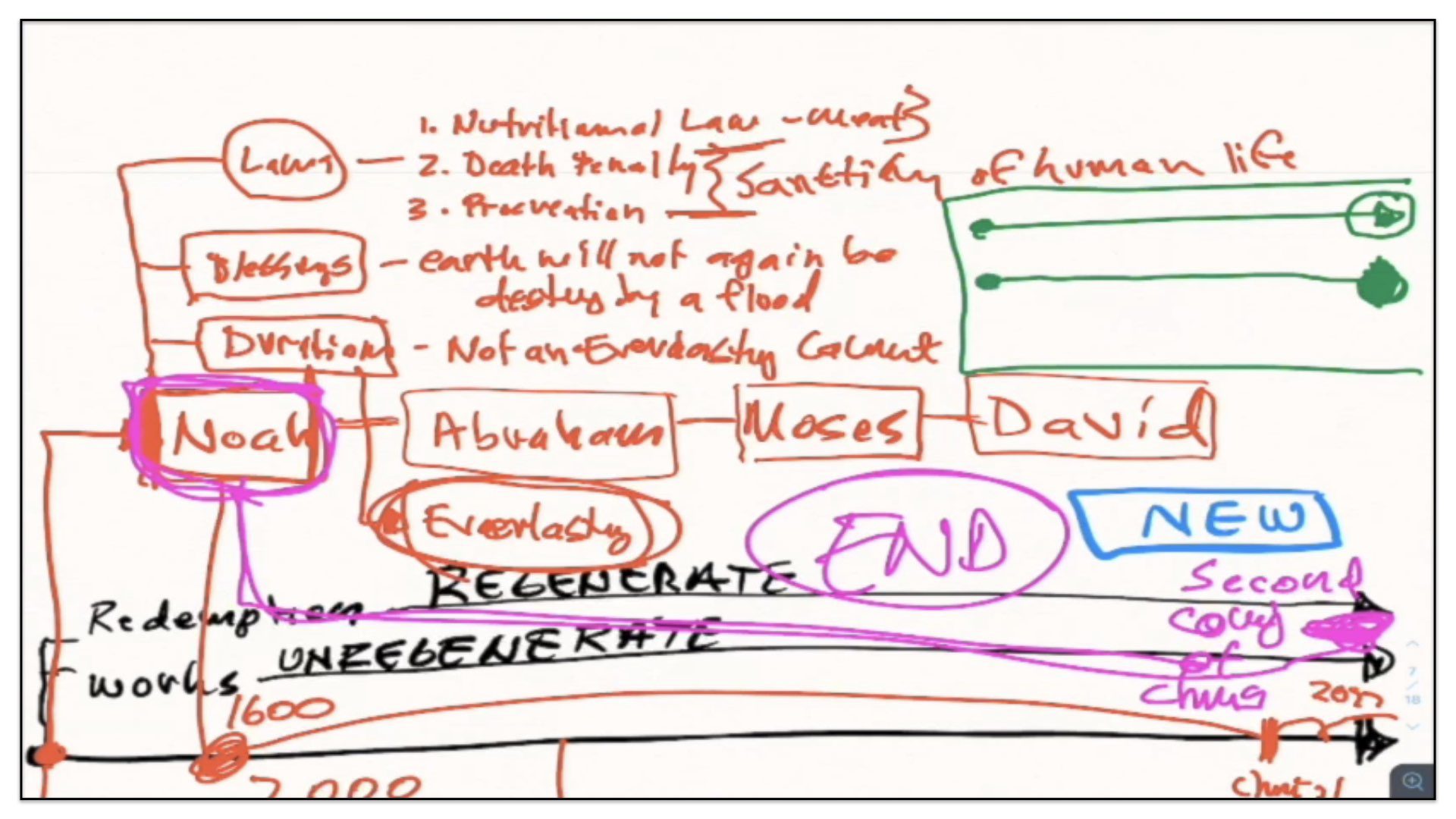
In fact, let me put that down here the notes. I’ll choose a different color pen. Let’s choose pink. The Noahic Covenant points to the second coming of Christ, at which time the Noahic Covenant will end. It will be terminated. And Christ will on that day of His return destroy this earth and all that is in it. Not with a flood of waters, but with a burning fire, after which Christ will recreate the heavens and the earth. And in this resurrection of God’s elect people with their bodies and the resurrection of the non-elect with their bodies—the non-elect in their bodies will be cast into hell forever where they will then suffer body and soul everlasting; whereas God’s elect people, redeemed by Christ and regenerated by the Spirit, they shall forever live with the Lord God, with Christ in this new earth and new heaven and in the heavenly of heavens forever.
The Noahic Covenant Grants To Us The Promised Preservation Of The Blessings We Now Enjoy Upon This Earth Until The Blessed Day Of The Messiah’s Return, At Which Time This Covenant Will Be Terminated And The New World Ushered In By Christ
This my dear friends is the essence of the Noahic Covenant. It grants to us the promised preservation of the blessings we now enjoy upon this earth until the blessed day of the return of the Lord Jesus Christ, at which time the Noahic Covenant will be terminated and the new world will be ushered in and Christ will triumph evidently and physically and obviously above all—all things placed under His footstool.
A Final Word
Now that’s what I have to say to you on the Noahic Covenant. I see our time and I am trying my best to be conscious of the timetable. I was going to highlight in this study just an overview of the Abrahamic, Mosaic and Davidic Covenants, but I’m now going to leave that for our next study. I’ll give you a little overview of those covenants and then my full explanation of them in next week’s study and I’m looking forward to that.
Listen, between now and then I hope the teachings I’m sharing with you are a challenge and help to you. I’m conscious that many of you come from a background where you’ve embraced a different view of the biblical covenants and the things I’m saying may not be connecting with you. Well, I want to thank you for the patients you’re showing by at least watching and considering these teachings. And for the others of you, you may simply just be overwhelmed by the material. You’ve never really considered the biblical covenants, you’ve never formed definite views on them and therefore everything I’m presenting to you just seems to be so fast-paced and so much information to take in and process. Well again, I thank you for your patience and I hope that God will give you grace. I pray He’ll give you grace to be able to think through these issues and form clear views on the biblical covenants.
Of course, unless there’s an interest in our hearts for a line of teaching, we’re not going to find much benefit from that teaching. That is true, you know. That’s why so many people like what they call practical teachings, because they find more interest in things that they can relate to practically, than things that are theoretical. Well, I fear that a topic such as the biblical covenants may come across to some of you as theoretical, not very practical. And therefore before we even have an opportunity of working through the issues, you’re already tuning out. You’ve already lost interest. You never had the interest to begin with. I want to encourage you this week. Why not nurture an interest in this topic? If you nurture an interest in the topic and begin looking into it, I guarantee you my dear friend, you’re going to find practical issues within the subject. It will enter-tie with your faith in Christ, you’ll begin to see new avenues of truth open up and your understanding of the scriptures will be so much of a clearer when you’re reading through the books of the Bible, which ultimately that is our goal. We want to understand the teachings of God’s Word as we read through the scriptures and I hope these studies on the covenants is granting you that blessing.
Okay. Well, I want to wish upon you the blessings of the Lord in your life throughout the course of the next seven days until we meet again.
Jared Smith served twenty years as pastor of a Strict and Particular Baptist church in Kensington (London, England). He now serves as an Evangelist in the Philippines, preaching the gospel, organizing churches and training gospel preachers.
Jared Smith's Online Worship Services
Jared Smith's Sermons
Jared Smith on the Gospel Message
Jared Smith on the Biblical Covenants
Jared Smith on the Gospel Law
Jared Smith on Bible Doctrine
Jared Smith on Bible Reading
Jared Smith's Hymn Studies
Jared Smith on Eldership
Jared Smith's Studies In Genesis
Jared Smith's Studies in Romans
Jared Smith on Various Issues
Jared Smith, Covenant Baptist Church, Philippines
Jared Smith's Maternal Ancestry (Complete)




